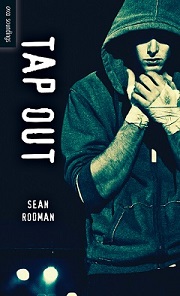| ________________
CM . . .
. Volume 21 Number 20 . . . . January 30, 2015
excerpt:
Darwin has transferred from public school to Norfolk Academy, a private school in the better end of town. His mom wants him to make more of himself, and she hopes this new school will keep him from following in the footsteps of Darwin’s dad who is in prison for almost beating a man to death. A new setting, however, does not erase Darwin’s father’s influence. Darwin’s dad taught him to fight for survival, and Darwin looks to pick a fight as if on instinct. When a classmate asks him to be the star in an illegal fight club at school, Darwin accepts the offer, receiving a cut from the betting cash and beating all his opponents. He initially justifies his fighting as earning some cash to help his family financially, but he soon feels that he is not proud of the means of his earnings. He learns that his behaviour is threatening the integrity of his character as his reputation as a fighter begins to become his identity. Realizing that his father was wrong, and that not everything in life has a clear winner and loser, Darwin sees that he is not fighting for survival but that he is a pawn in the fight club and being used for people’s entertainment. Rodman is smart in constructing the plot so that the authorities do not intervene and correct Darwin’s behaviour, but Darwin has to make a decision and change the direction of his own life, choosing to report the fight club to a teacher when the situation worsens. The story remains realistic in that Darwin faces consequences for his illegal behaviour (expelled from school and a possible sentence to juvenile detention, with the consolation that he succeeded in correcting a wrong by coming forward to report the fight club). Since the novel does not reveal a precise setting, Darwin’s story could happen in any city where a teen from the tough side of town struggles with his familial and financial background as he comes of age. His character almost moulds into a stereotypical bad boy, aggressively attacking any threats to his reputation at school, lying to his mother, and protective of his girlfriend. The complexity of his character unfolds in the scenes at home, in his relationships with his mother, little brother, and dad. Tap Out is part of the “Orca Soundings” collection meant for reluctant teen readers. The language is, therefore, simple, and the subject matter would appeal to teenage boys who enjoy the action of fist-fighting and girls who would enjoy reading from the perspective of a misunderstood young man. The ending mirrors the beginning, in the form of a letter from Darwin, responding to his dad’s earlier letter that outlined the reasons to fight. Darwin’s direct response reveals Darwin’s change of ideology in a way that might be too explicit for more advanced readers. Unlike other novels for reluctant teen readers, this one does not deal with alcohol or illegal substance abuse which is refreshing. Violence is the issue under discussion, and the story invites readers to compare the criminal behaviour of Darwin’s fighting with the manipulative behaviour of the classmate who organizes the fight club. The subject matter is, therefore, appropriate for grade seven readers and can be enjoyed by teens up to grade ten who have below grade reading levels. Recommended.
Hayley Toivanen is studying English Literature at Queen’s University in Kingston, ON.
To comment on this title or this review, send mail to cm@umanitoba.ca.
Copyright © the Manitoba Library Association. Reproduction for personal use is permitted only if this copyright notice is maintained. Any
other reproduction is prohibited without permission.
CM Home |
Next Review |
(Table of Contents for This Issue - January 30, 2015.)
| Back Issues | Search | CM Archive
| Profiles Archive |
